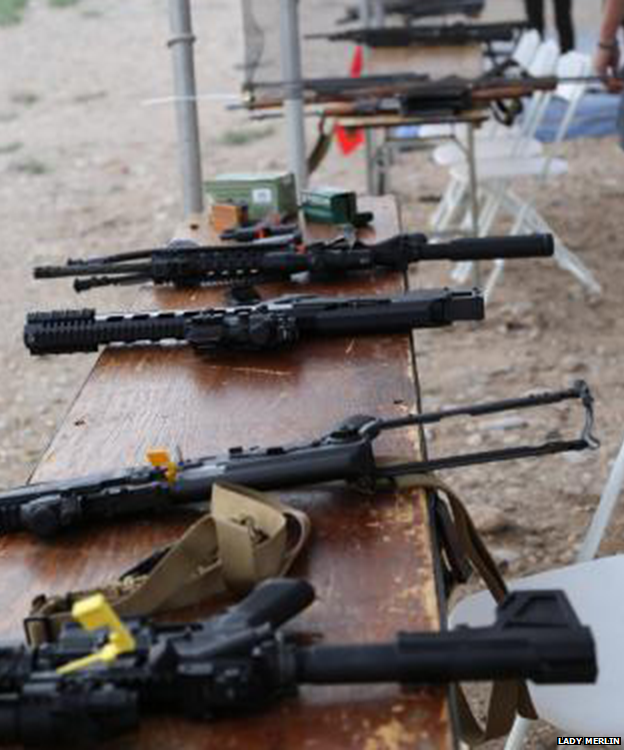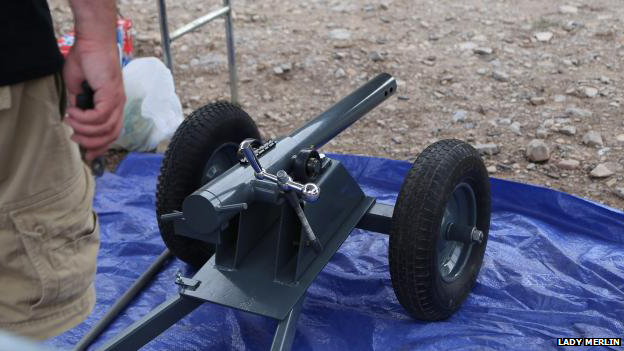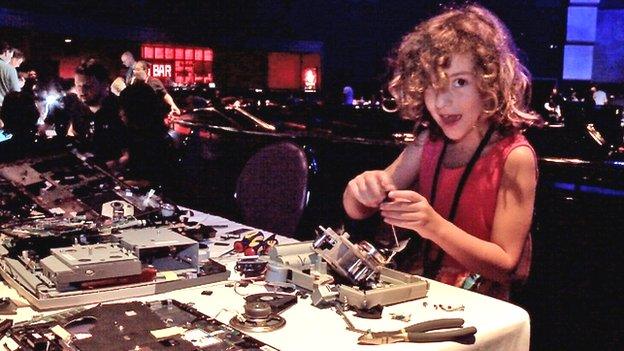A journey into Def Con country
- Published
Before the start of Def Con some of the hackers took to the desert to shoot guns
Leaving Vegas we drove down Frank Sinatra highway, took Dean Martin drive and then turned on to Blue Diamond highway and headed west.
The temperature was in the high 90s but the air con was on and we were cool, driving towards the Spring mountains - one part of the jagged range that ring the valley in which Las Vegas sits.
Soon the hotels, motels and bars gave way to strip malls, then isolated settlements, lonesome farms and ranches, scrubland and finally, the desert. We drove past Wounded Horse Trail and a cell tower disguised as a tree, climbing all the while as we drove into the national park.
At Lovell Canyon road we turned off, the blacktop becoming a dusty trail we followed for six miles until we reached our destination - the Def Con shoot.

The shooters burn through a lot of bullets during the event
"Before Def Con starts every summer some of us come out here to the desert, bring a lot of our hardware with us and get a little trigger time," said Deviant Ollam, the hacker who organises the get together for fans of a very different kind of hardware.
There are historic links between the world of computer security and weaponry. For many years strong encryption systems were subject to the same export restrictions as munitions. A lot of the leading lights in the hacker world, who attend Def Con every year, cut their coding, public policy and media teeth in those long-running "crypto wars".
But that history does not concern the 60 or so folks who attended the first night of the Def Con shoot this year. What they like, said one attendee, was the fact that it gave them a chance to shoot outdoors.
"If you live in a metropolitan area," he said, "you might have to drive a long way to find somewhere you can shoot outside."

All manner of automatic weapons, pistols and shotguns were brought along to the shoot
The spot picked for the shoot is well-known among locals as a place to practice. The canyon floor is littered with old bullets and shotgun shells.
Shooting in the evening is best, said Dev, because that's when the sun dips behind the mountain and the fierce desert heat drops to a comfortable 80 degrees or so.
Then, after the safety briefing, they got on with the shooting. 10 lanes had been set up, each one had a tent covering the firing position and all had a net strung across their right side to catch the spent brass, ammo, as it was ejected from the gun.
The cannon
The noise produced was deafening. Some smaller calibre guns cracked like a cap gun but with some of the others the shock wave was like a slap. We scrambled to put in ear plugs to avoid damaging our hearing.
And then there was the cannon.

The cannon uses black powder and uses spherical, one pound lead fishing weights as cannon balls
"I had it designed and built for me, it's one of a kind," said Puking Monkey, a Def Con attendee who preferred not to give his real name.
"There's not too many other places that I can fire the cannon," he said. "It's quite a bit louder than regular firearms."
Indeed it was. It went off with a huge, heavy whoomp you could feel in your gut and it kicked up a huge dust cloud so thick that it prompted a pause in the heavy rate of fire as it rolled across the range.
Oddly, said Puking Monkey, the cannon is not considered a firearm. This is largely because its dimensions fall outside the US laws that define a firearm. It is fired with gun powder that, also oddly, is not hard to find or buy in America.
"You can get it off the shelf in places like Pennsylvania," he said.
And that's where there is another parallel with computer security. Both invite trouble if practitioners overstep the legal limits. US gun owners tend to know the law surrounding what they can shoot and they know the exceptions. Same with hacking and research. They know their rights.
'Boom'
And there are other connections between these two worlds, said Dev Ollam.
Hackers and gun owners tend to espouse libertarian politics.
"Often you hear espoused the view that something you create could be used for harm or could be used for good," he said. "It's the users choice to deploy or implement in an ethical or unethical manner."
And, he said, both guns and code often elicit the same responses in the public at large.
"A lot of people that are afraid of others, maybe because they have knowledge or abilities or technology that they don't possess, they say that's bad, I'm scared of that because I don't understand it," he said.
"So, we go through this a lot between all of our skill sets, including the ones that go boom."
- Published7 August 2015

- Published6 August 2015
- Published11 August 2014
